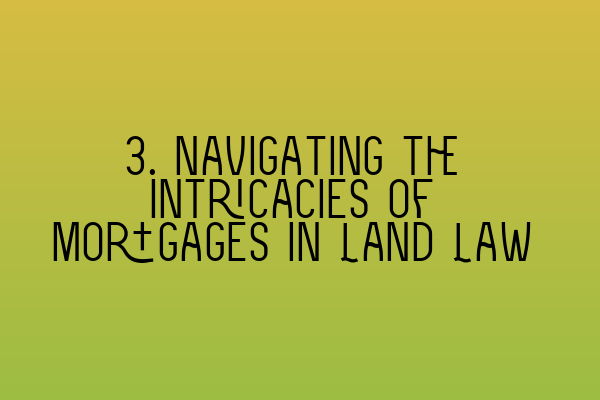3. Navigating the Intricacies of Mortgages in Land Law
Welcome back to SQE Property Law & Land Law! In today’s post, we will delve into one of the most intricate aspects of land law: mortgages. Whether you are a solicitor, aspiring lawyer, or simply interested in expanding your knowledge, this article is packed with valuable information to help you navigate the complexities of mortgages in land law.
Mortgages – A Brief Overview
In the realm of land law, mortgages play a significant role in property transactions. A mortgage, in simple terms, is a legal agreement between a borrower and a lender, typically a bank or financial institution. It allows the borrower to obtain funds to purchase a property while offering the lender security in the form of the property itself.
Understanding the intricacies of mortgages is crucial when dealing with property transactions. As a solicitor, having a comprehensive understanding of mortgage law is essential in providing expert advice and ensuring your clients make informed decisions.
Types of Mortgages
There are various types of mortgages, each with its own specific features and implications. Let’s explore a few common types:
- Fixed-Rate Mortgages: This type of mortgage has a fixed interest rate for a predetermined period, usually between two to five years. It provides borrowers with stability, as they know exactly the amount they need to repay each month.
- Variable-Rate Mortgages: These mortgages are linked to an external interest rate, such as the Bank of England base rate or the lender’s standard variable rate. The interest rate can fluctuate over time, meaning borrowers’ monthly repayments may change accordingly.
- Interest-Only Mortgages: With interest-only mortgages, borrowers only repay the interest on the loan amount rather than the capital. This type of mortgage requires a separate vehicle, typically an investment or savings plan, to repay the capital at the end of the term.
Understanding the different types of mortgages is crucial when advising clients on the most suitable option for their circumstances. By staying up-to-date with market trends and evolving mortgage products, you can ensure your clients make informed decisions.
Key Considerations and Legalities
As a solicitor, it’s essential to guide clients through the key considerations and legalities associated with mortgages. Here are a few key points to keep in mind:
- Loan to Value Ratio (LTV): LTV is the percentage of the property’s value that a mortgage lender is willing to lend. Different lenders may offer varying LTV ratios, and it’s crucial to analyze these ratios and advise clients accordingly.
- Repossession and Foreclosure: It’s important to educate clients on the potential risks of defaulting on mortgage repayments, which may lead to repossession or foreclosure of the property. Ensuring clients fully understand the consequences can help them make informed decisions.
- Redemption Penalties: Some mortgages carry redemption penalties if the borrower repays the loan before a specified period. These penalties can significantly impact a borrower’s financial situation, and it’s crucial to consider them when advising clients.
By carefully considering these legalities and providing expert advice, you can ensure your clients have a clear understanding of their mortgage commitments and associated risks.
Conclusion
In conclusion, mortgages are a vital aspect of land law, and navigating their intricacies is crucial for solicitors and legal professionals. By understanding the types of mortgages available and the legal implications associated with them, you can provide expert advice to clients, safeguarding their interests during property transactions.
At SQE Property Law & Land Law, we are dedicated to providing comprehensive resources and training to help legal professionals excel in their practice. If you’re preparing for the SQE exams, make sure to check out our SQE 1 Practice Exam Questions and SQE 1 Practice Mocks FLK1 FLK2. We also offer SQE 2 Preparation Courses and SQE 1 Preparation Courses to help you succeed in your legal career.
Stay tuned for more informative articles on property law and land law. For important dates and updates regarding the SRA SQE examinations, do check our SRA SQE Exam Dates page.
Let us know in the comments if you found this article helpful or if you have any specific topics you would like us to cover in future posts.
